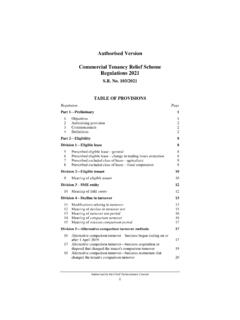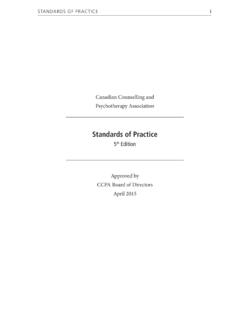Transcription of National Cabinet Mandatory Code of Conduct - SME ...
1 National Cabinet Mandatory code OF Conduct SME COMMERCIAL LEASING PRINCIPLES DURING COVID-19 PURPOSE The purpose of this code of Conduct ( the code ) is to impose a set of good faith leasing principles for application to commercial tenancies (including retail, office and industrial) between owners/operators/other landlords and tenants, where the tenant is an eligible business for the purpose of the Commonwealth Government s JobKeeper programme. These principles will apply to negotiating amendments in good faith to existing leasing arrangements to aid the management of cashflow for SME tenants and landlords on a proportionate basis as a result of the impact and commercial disruption caused by the economic impacts of industry and government responses to the declared Coronavirus ( COVID-19 ) pandemic.
2 This code applies to all tenancies that are suffering financial stress or hardship as a result of the COVID-19 pandemic as defined by their eligibility for the Commonwealth Government s JobKeeper programme, with an annual turnover of up to $50 million (herein referred to as SME tenants ). The $50 million annual turnover threshold will be applied in respect of franchises at the franchisee level, and in respect of retail corporate groups at the group level (rather than at the individual retail outlet level). The Parties to this code concur that during the COVID-19 pandemic period, as defined by the period during which the JobKeeper programme is operational, the principles of this code should nevertheless apply in spirit to all leasing arrangements for affected businesses, having fair regard to the size and financial structure of those businesses.
3 Appendix I gives examples of proportionate solutions that may be agreed under this code , and forms part of the overall code . The code has been developed to enable both a consistent National approach and timely, efficient application given the rapid and severe commercial impact of official responses to the COVID-19 pandemic. PARTIES TO THE code The code will be given effect through relevant state and territory legislation or regulation as appropriate. The code is not intended to supersede such legislation, but aims to complement it during the COVID-19 crisis period.
4 OVERARCHING PRINCIPLES The objective of the code is to share, in a proportionate, measured manner, the financial risk and cashflow impact during the COVID-19 period, whilst seeking to appropriately balance the interests of tenants and landlords. It is intended that landlords will agree tailored, bespoke and appropriate temporary arrangements for each SME tenant, taking into account their particular circumstances on a case-by-case basis. The following overarching principles of this code will apply in guiding such arrangements: Landlords and tenants share a common interest in working together, to ensure business continuity, and to facilitate the resumption of normal trading activities at the end of the COVID-19 pandemic during a reasonable recovery period.
5 Landlords and tenants will be required to discuss relevant issues, to negotiate appropriate temporary leasing arrangements, and to work towards achieving mutually satisfactory outcomes. Landlords and tenants will negotiate in good faith. Landlords and tenants will act in an open, honest and transparent manner, and will each provide sufficient and accurate information within the context of negotiations to achieve outcomes consistent with this code . Any agreed arrangements will take into account the impact of the COVID-19 pandemic on the tenant, with specific regard to its revenue, expenses, and profitability.
6 Such arrangements will be proportionate and appropriate based on the impact of the COVID-19 pandemic plus a reasonable recovery period. The Parties will assist each other in their respective dealings with other stakeholders including governments, utility companies, and banks/other financial institutions in order to achieve outcomes consistent with the objectives of this code . All premises are different, as are their commercial arrangements; it is therefore not possible to form a collective industry position. All parties recognise the intended application, legal constraints and spirit of the Competition and Consumer Act 2010.
7 The Parties will take into account the fact that the risk of default on commercial leases is ultimately (and already) borne by the landlord. The landlord must not seek to permanently mitigate this risk in negotiating temporary arrangements envisaged under this code . All leases must be dealt with on a case-by-case basis, considering factors such as whether the SME tenant has suffered financial hardship due to the COVID-19 pandemic; whether the tenant s lease has expired or is soon to expire; and whether the tenant is in administration or receivership.
8 Leases have different structures, different periods of tenure, and different mechanisms for determining rent. Leases may already be in arrears. Leases may already have expired and be in hold-over. These factors should also be taken into account in formulating any temporary arrangements in line with this code . As the objective of this code is to mitigate the impact of the COVID-19 pandemic on the tenant, due regard should be given to whether the tenant is in administration or receivership, and the application of the code modified accordingly.
9 LEASING PRINCIPLES In negotiating and enacting appropriate temporary arrangements under this code , the following leasing principles should be applied as soon as practicable on a case-by-case basis: 1. Landlords must not terminate leases due to non-payment of rent during the COVID-19 pandemic period (or reasonable subsequent recovery period). 2. Tenants must remain committed to the terms of their lease, subject to any amendments to their rental agreement negotiated under this code . Material failure to abide by substantive terms of their lease will forfeit any protections provided to the tenant under this code .
10 3. Landlords must offer tenants proportionate reductions in rent payable in the form of waivers and deferrals (as outlined under definitions, below) of up to 100% of the amount ordinarily payable, on a case-by-case basis, based on the reduction in the tenant s trade during the COVID-19 pandemic period and a subsequent reasonable recovery period. 4. Rental waivers must constitute no less than 50% of the total reduction in rent payable under principle #3 above over the COVID-19 pandemic period and should constitute a greater proportion of the total reduction in rent payable in cases where failure to do so would compromise the tenant s capacity to fulfil their ongoing obligations under the lease agreement.


